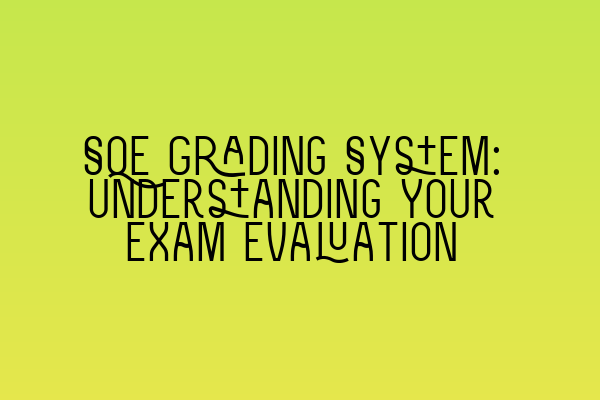SQE Grading System: Understanding Your Exam Evaluation
Are you currently preparing for the Solicitors Qualifying Examination (SQE)? If so, one of the key aspects you need to familiarize yourself with is the SQE grading system. Understanding how your exam will be evaluated can help you better prepare and strategize your study approach. In this article, we will delve deep into the SQE grading system, providing you with all the essential insights you need to succeed.
What is the SQE Grading System?
The SQE grading system is a standardized method used to evaluate candidates’ performance in the Solicitors Qualifying Examination. It provides a structured framework for assessing the knowledge, skills, and competencies required to practice as a qualified solicitor.
In the SQE, each assessment is graded on a scale of 1 to 4. Let’s take a closer look at what each grade signifies:
- Grade 1: You have demonstrated a strong understanding of the subject matter and have showcased exceptional analytical and problem-solving skills.
- Grade 2: You have shown a good understanding of the subject matter and have adequately applied your knowledge to solve legal problems.
- Grade 3: You have displayed a basic understanding of the subject matter but have struggled to apply your knowledge effectively.
- Grade 4: Your performance indicates a limited understanding of the subject matter, and you have not demonstrated the necessary skills and competencies expected of a solicitor.
It’s important to note that each assessment within the SQE is independently graded, and the final result is determined by a combination of the grades attained in each assessment.
How to Interpret Your SQE Exam Results
Once you receive your exam results, it’s crucial to understand how to interpret them effectively. Here are a few key points to consider when reviewing your SQE exam results:
- Identify your strengths and weaknesses: Review your grades in each assessment to identify areas where you performed well and areas that need improvement. This analysis can help you tailor your study plan for future exams.
- Understand the importance of each assessment: Some assessments may carry more weight in the overall evaluation process. Consulting with your course provider or tutor can provide you with insights into how each assessment contributes to your final result.
- Seek feedback: If available, request feedback on your performance from your course provider or tutor. Understanding the specific areas where you excelled or struggled can help you refine your study techniques for future exams.
Now that you have a better understanding of the SQE grading system and how to interpret your exam results, let’s explore some additional resources that can further enhance your preparation.
Related Articles
- Tenant Rights in the UK: Understanding Your Legal Protections
- Examining the Intricacies of Land Law in the UK
- Legal Considerations in Residential Leases: Essential Insights for Solicitors
- Workshops on Land Law: Interactive Learning for Aspiring Property Law Professionals
- Lease Laws in the UK: Unraveling the Legal Framework for Tenants
By exploring the articles mentioned above, you can gain valuable insights into related topics that will contribute to your overall understanding of the legal profession. These resources can provide you with additional knowledge and support as you navigate through your SQE preparation.
Remember, success in the SQE requires not only a solid knowledge base but also the ability to effectively apply that knowledge to real-life legal scenarios. Understanding the SQE grading system and using it as a guide can help you prioritize your study efforts and approach the exams with confidence.
Good luck with your SQE preparation, and remember to stay focused, study smart, and believe in your capabilities!

Leave a Reply